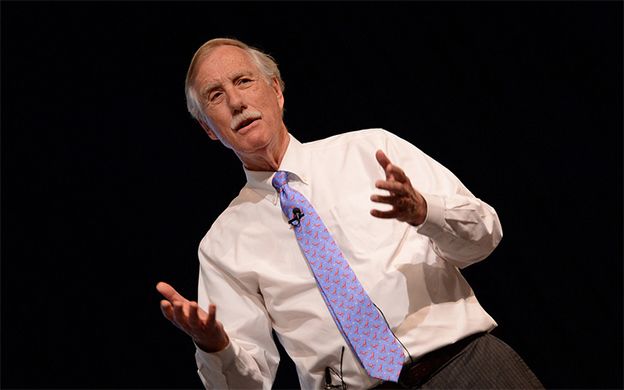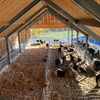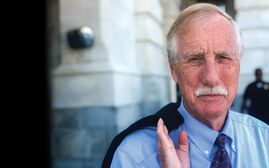King outlines road map for closing Maine's rural digital divide
 Courtesy / U.S. Naval War College, Flickr
U.S. Sen. Angus King, I-Maine, released a white paper Tuesday outlining a policy 'road map' for closing rural Maine's digital divide. Maine's junior senator attended Tuesday's launch of Ellsworth's Open Access Fiber Optic Network.
Courtesy / U.S. Naval War College, Flickr
U.S. Sen. Angus King, I-Maine, released a white paper Tuesday outlining a policy 'road map' for closing rural Maine's digital divide. Maine's junior senator attended Tuesday's launch of Ellsworth's Open Access Fiber Optic Network.
U.S. Sen. Angus King, I-Maine, took Tuesday’s launch of Ellsworth’s Open Access Fiber Optic Network as an opportunity to highlight a policy road map with several proposals for closing rural Maine’s digital divide.
King joined state and local officials, including the Ellsworth Business Development Corp. and Northern Border Regional Commission Co-Chairman Mark Scarano, at the network’s launch, which was held at the Union River Center for Innovation in Ellsworth, an incubator for startup businesses. The open access fiber network provides high-speed internet to the center and establishes next-generation connectivity for businesses along the fiber network in Ellsworth.
“Whether it’s boatbuilding, manufacturing or financial services, businesses in Maine rely on high-speed internet connectivity to grow and create jobs in their communities,” King said in a news release. “The public-private partnership we saw here in Ellsworth today oils the wheels of economic progress. This new open-access fiber network is a link to the region that will increase business opportunities and access to employment and it’s something that I hope can be repeated in towns and cities across Maine.”
Road map for closing digital divide
King also released a proposal outlining next steps to help meet broadband challenges in Maine, including strategies to connect rural communities and close the digital divide. Among them:
1) Modernize federal programs that support broadband: Building on the successful modernization of programs at the Federal Communications Commission, such as the federal E-rate program, and programs at the U.S. Department of Agriculture, the federal government must ensure broadband resources are modernized and adequate in order to support the connectivity rural America needs to prosper, King wrote.
“In doing so, we need to ensure better and more accurate broadband data collection and coordinate broadband support across federal agencies and in partnership with local, state, and private resources,” he said. “To that effect, I have co-sponsored the Broadband Connections for Rural Opportunity Program Act, bipartisan legislation that will modernize USDA Rural Utilities Service programs and help rural America access grant and loan funding.”
2) Make broadband a priority in federal infrastructure investment: “From large companies to small businesses on Main Street, to farms in rural Maine, to rural health and education providers, individuals and families, broadband access is not a luxury,” King said. “It is a necessity equal to roads, bridges and other critical infrastructure. Access to the internet expands economic and social opportunities for commerce and strengthens our economy and rural communities.”
To address that need, King said he led a bipartisan effort earlier this year urging the Trump administration to include broadband in any infrastructure package.
3) Remove obstacles and reduce costs to broadband deployment: In order to help lower the cost of deployment of advanced broadband networks in rural America, King said, “the federal government needs to remove obstacles for states and local communities that want to streamline broadband deployment regulations, including pole attachment and wireless siting rules. The federal government should foster a cost and time efficient regulatory environment that helps spur broadband deployment and incentivizes increased private investment in broadband networks.”
In the months ahead, King added, he would be working to identify “strategies and legislation that will help the federal government remove these barriers, encourage states to adopt model pole attachment policies, and improve deployment in rural America.”
4) Improve digital equity and closing the rural divide: Broadband, both fixed and wireless, needs to be accessible and affordable to all Mainers regardless of where they live, study or work, King wrote.
“Given that one-third of low-income householders with school-age children lack adequate high-speed internet, I successfully advanced bipartisan federal legislation through the reauthorization of the Every Student Succeeds Act to support innovative strategies to connect rural students to the internet outside of the classroom,” he said, adding that he plans to continue to work on closing that “homework gap.”
King is co-founder of the Senate Broadband Caucus, a bipartisan caucus working group developing solutions and strategies to accelerate broadband deployment in order to strengthen the digital economy and to close the digital divide, especially in rural America.
Increasing access to rural broadband is also an integral part of the plan he unveiled this spring to help grow Maine’s rural economy and create jobs.














Comments